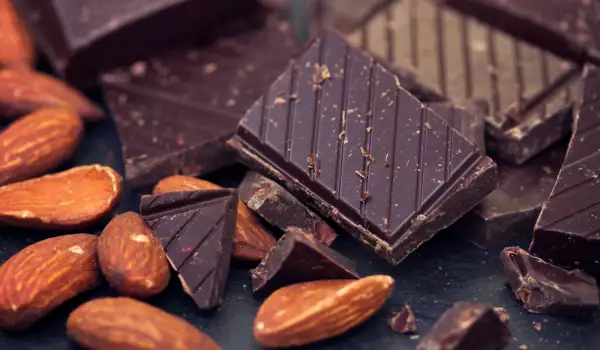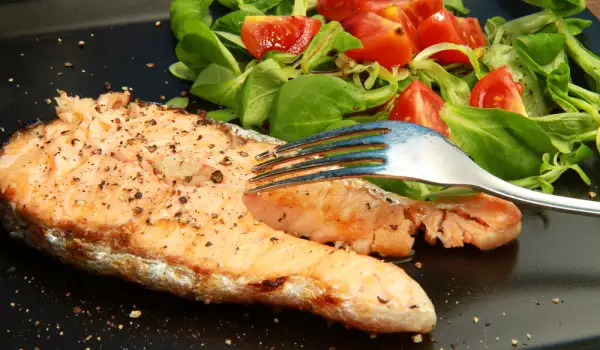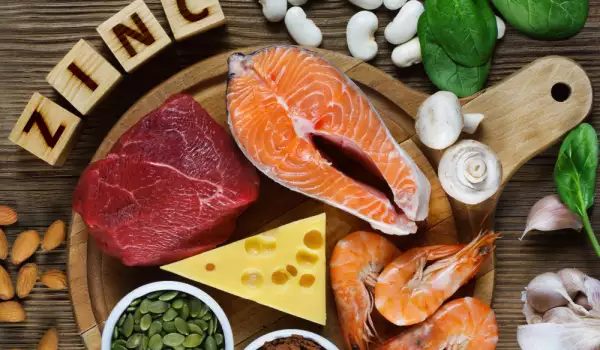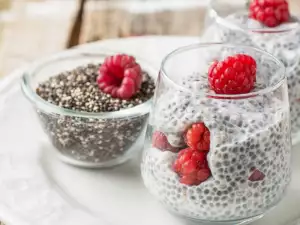Zinc is an important element, which is one of the vital elements in the body. It is necessary for the normal functioning of absolutely every cell in the human body.
Normally, the human body should contain two to three grams of zinc. Zinc is one of the enzymes, which provides the most important functions such as growth, metabolism, protein synthesis, the activation of immune responses, maintenance of memory, good eyesight, maintenance of taste and smell and normal functioning of the reproductive system.
What are the sources of zinc?
Wheat bran and germinated wheat, as well as sunflower and pumpkin sprouts, mushrooms and oysters contain 130 milligrams of zinc per kilogram of product.
Pork, chicken, beef and offal contain up to 140 milligrams per kilogram of product. Freshwater fish and beef liver contain up to 85 milligrams and wholemeal bread, rabbit meat, egg yolks and nuts contain up to 50 milligrams.
Brewer's yeast, onions, garlic, canned meat and fish contain up to 20 milligrams of zinc per kilogram of product and white bread, fruit and vegetables, saltwater fish and milk contain up to 8 milligrams of zinc.
Zinc is a key mineral, which helps to strengthen the immune system, regulate vitamin A levels, regulate the metabolism, heal wounds, treat colds and other ailments. Zinc deficiency can cause indigestion, brittle nails and hair, acne, dry skin, diarrhea, loss of appetite and decreased immunity.
The best sources of zinc are animal products. Below is a list of the most recommended foods, which are rich in this mineral.
The best sources of zinc
Egg yolk
Egg yolk is a good source of zinc, as well as vitamins A, E, D and K and other essential minerals. 100 grams of egg yolk contains 4.93 milligrams of zinc. That's why you should eat various omelets, custards, egg salads, egg desserts and stuffed eggs more.
Turkey meat
Turkey meat is one of the best sources of zinc, but it is important to cook it in a healthy way. Avoid turkey sausages and fried turkey such as kebab. 100 grams of turkey meat contains 3.09 milligrams of zinc. Emphasize more on turkey soup, turkey steaks, stuffed turkey and turkey skewers.
Dark chocolate

If you haven't had enough reasons to eat dark chocolate, here's another very good one. Dark chocolate contains a large amount of zinc - 9, 6 milligrams per gram. However, be careful not to go overboard with it, because you can gain weight! But 2-3 pieces of chocolate in nut candies or in no-bake desserts will not be bad for you.
Sesame seeds
Sesame seeds can be sprinkled in dietary salads, healthy smoothies and added to keto bread or keto biscuits. They contain an impressive amount of zinc - 7.75 milligrams per gram.
Lamb
Another good source of zinc is lamb - 8.66 milligrams of zinc per gram. No more than the recommended amount should be consumed. Emphasize on lamb soup, roasted lamb, lamb chops and other lamb dietary recipes.
Mushrooms
Mushrooms contain many essential vitamins and minerals, including zinc. 100 grams of shiitake contain 7.66 milligrams of zinc.
Cashew
Cashews are a very healthy food, rich in zinc and healthy fats. 100 grams of cashews contain 5.35 milligrams of zinc. Add cashews to more vegan vegetable spreads, sauces, salads and homemade ice cream.
Pumpkin seeds
Pumpkin seeds are rich in nutrients and are also an excellent source of zinc. 100 grams of pumpkin seeds contain 7.81 milligrams of zinc.
Fruit and vegetables are not rich in zinc. Therefore, vegetarians may develop zinc deficiency. Prolonged consumption of very salty or very sweet foods can also reduce the zinc in the body.
Zinc deficiency can be caused by thyroid and kidney problems, as well as by taking birth control pills. Zinc deficiency can cause growth retardation in children and infertility in men and women, as well as impotence.
Zinc deficiency also manifests itself in memory loss and irritability, hair loss, blackheads, loss of appetite and smell, frequent infections and high cholesterol.
If you have zinc deficiency, white spots appear on the nails. This is often one of the signs of an allergy. To deal with it, consume more products of animal origin, germinated wheat and wholemeal bread.

Regular and varied diet will ensure a good intake of zinc and the benefits of it are truly amazing.
Benefits of zinc
1. Improves the productivity and physical strength of athletes who perform intense training, as it plays an important role in hormone production.
2. Prevents cancer and strengthens the immune system
Recent studies show a shortage of zinc in several cancers: breast cancer, ovarian cancer, colon cancer, lung cancer, skin cancer or leukemia.
Zinc deficiency has a profound effect on the immune system due to the fact that the lack of optimal concentrations in the body causes a rapid decline in T cell function. T-cells or T-lymphocytes are lymphocytes with a central role in cell-mediated immunity, helping the body to attack viruses or bacteria.
3. Improves the health of the cardiovascular system
Zinc plays an essential role in maintaining the health of cardiovascular cells and endothelium. Zinc deficiency can cause high cholesterol and inflammation, which are two important risk factors for heart disease.
4. Supports the reproductive system in men and maintains fertility
A recent study of 88 men between the ages of 40 and 60 found that men with normal testosterone levels had higher levels of zinc than those with low testosterone levels.
Zinc is needed to produce enzymes, which initiate cell division, but prostate tissue needs 10 times more zinc to function properly than other cells. Optimal levels of zinc in the prostate protect cells from destruction, inflammation or cancer.
5. Supports the health of the reproductive system in women
In women, zinc is involved in the growth and maturity of eggs, so women with zinc deficiency eventually have problems with ovulation and indirectly, the problem of infertility.
6. It has a strong antioxidant effect
Zinc is an excellent antioxidant, which neutralizes free radicals by binding to them. Zinc plays an important role in counteracting the negative effects of excess iron and radicals, which increase inflammation.
7. Improves sleep, cognitive function and energy levels
Zinc ensures the optimal functioning of neurotransmitters that communicate with the rest of the body, by helping to maintain the cognitive function. It is needed in the metabolism of melatonin, a key hormone for a healthy body.
By being involved in the activity of over 300 enzymes, zinc has many other benefits for the human body and this explains why even the smallest deficiency can cause unwanted symptoms or conditions.




















Comments